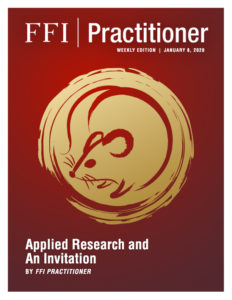
View this edition in our enhanced digital edition format with supporting visual insight and information.
Welcome to the first issue of FFI Practitioner in 2020. Or, if you prefer, a precursor issue to the Year of the Rat, which begins on January 25. This issue features a report of the first applied research project sponsored by the FFI 2086 Society. It is entitled “Professionalizing the Business Family: The Five Pillars of Competent, Committed and Sustainable Ownership.” Three other recent studies are also included as FFI Practitioner continues to place before its readers the latest in applied research, creating a forum for researchers and practitioners to interact on specific topics. Read more for the “invitation” which accompanies each report.
Professionalizing the Business Family: The Five Pillars of Competent, Committed and Sustainable Ownership (released January 2020)
Authored by Claudia Astrachan (Lucerne University of Applied Sciences & Arts), Matthias Waldkirch (EBS University), Anneleen Michiels (Hasselt University), Torsten Pieper (University of North Carolina at Charlotte), and Fabian Bernhard (EDHEC Business School), this research hopes to inspire controversial discussions among business families, their advisors, and other stakeholders. The report challenges readers to question their beliefs on how to best support families in their quest to professionalize, looking beyond formal means of professionalization and governance.
This research was sponsored by the FFI 2086 Society.
The invitation: Please consider writing an FFI Practitioner article (800-1200 words) in response to one of the “five key findings for speed readers.” You can agree, extend, challenge, refute – whatever you would like, to leverage this study for the benefit of the field.
The Bright Side to Family Firms: How Socioemotional Wealth Importance Affects Dark Traits-Job Performance Relationships (released December 2019)
Authored by Benjamin McLarty (Mississippi State University) and Daniel Holt (Louisiana State University) this study examines socioemotional wealth’s influence at the individual level. An interactionist approach was used to test its moderation effect on the dark personality traits–job performance relationship, using supervisor-employee dyads in family firms. Termed the Dark Triad, dark personality traits include narcissism, psychopathy, and Machiavellianism.
This paper appeared in the December 2019 issue of Family Business Review (FBR).
The invitation: Professionals from the behavioral science field are especially encouraged to write an FFI Practitioner article exploring the practical implications of this research.
Governance in Family Businesses: Evidence and Implications (released December 2019)
Authored by Carol Howorth (University of York) and Martin Kemp (IFB Research Foundation), this report highlights how the governance requirements of family firms depend on their longevity and stage of development, with generational maturity requiring different solutions. While each family has different dynamics, structures, and interpersonal relationships, identifying best practices in family governance can help to ensure the smooth transition of businesses through generations of a family.
This research was undertaken by the Institute for Family Business (IFB) in London.
The invitation: This report contains a wealth of information on country-specific practices and protocols, and we invite authors to provide FFI Practitioner articles that expand on this topic from the unique perspective of their country or region of the world.
2019 Global Family Business Survey: The Impact of Changing Demographics on Family Business Succession Planning and Governance (released October 2019)
Authored by Andrea Calabrò (STEP Project Global Academic Director and IPAG Business School) and Alfredo Valentino (STEP Project Global Research Champion and ESCE International Business School), this report aims to foster debate and analysis on family businesses in different parts of the world. More than 1800 family business leaders from around the world shared their views on changing demographics and how they impact family business governance, succession, entrepreneurial orientation, and performance.
This survey was undertaken by the STEP Project for Family Enterprising and KPMG.
The invitation: Please keep this conversation going by writing an FFI Practitioner article based on the categories listed here: Differences in generational outlook, Retirement plan, Succession planning, Family governance and corporate governance, Gender effect and societal changes, Entrepreneurial orientation, Performance and main concerns.
For more details on writing for FFI Practitioner go here.
To discuss a topic in advance, email Dan Frosh, FFI Practitioner Managing Editor.

View this edition in our enhanced digital edition format with supporting visual insight and information.





